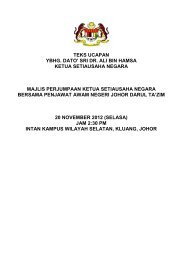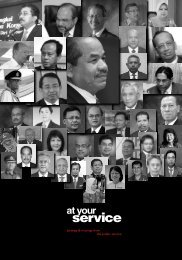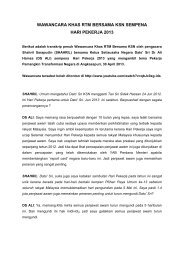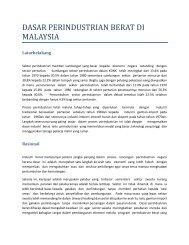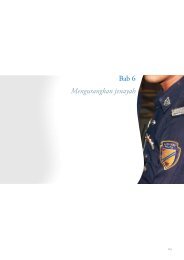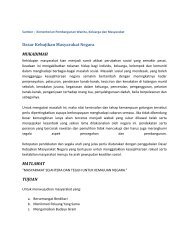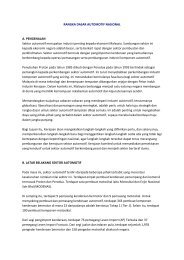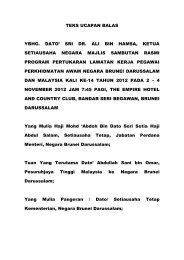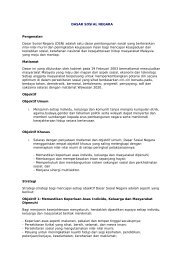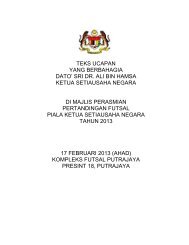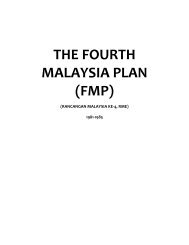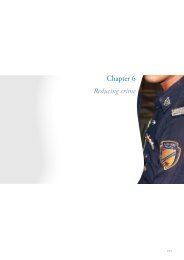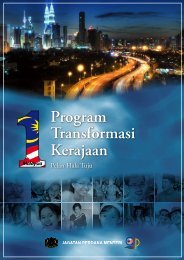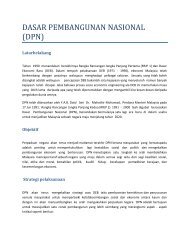GTP 2.0 - Prime Minister's Office of Malaysia
GTP 2.0 - Prime Minister's Office of Malaysia
GTP 2.0 - Prime Minister's Office of Malaysia
You also want an ePaper? Increase the reach of your titles
YUMPU automatically turns print PDFs into web optimized ePapers that Google loves.
Government-led<br />
HIGHLIGHTS OF THE KEY DIFFERENCES<br />
BETWEEN <strong>GTP</strong> 1.0 AND <strong>GTP</strong> <strong>2.0</strong><br />
Broad approach to managing<br />
low-income households (extreme<br />
poor and poor)<br />
Individual-focused<br />
<strong>GTP</strong> 1.0<br />
Eradicate extreme poor category<br />
and moving people out <strong>of</strong> the<br />
poor PLI<br />
1<br />
The poor and extreme poor will continue to be<br />
targeted under <strong>GTP</strong> <strong>2.0</strong>. However, the goals <strong>of</strong><br />
the 1AZAM programme will be more granular<br />
and state specific to target under-served districts<br />
and place greater emphasis on urban areas. The<br />
selection <strong>of</strong> 1AZAM participants will also be<br />
more stringent under <strong>GTP</strong> <strong>2.0</strong>. Selection priority<br />
will be given to participants who fall into one or<br />
more <strong>of</strong> the following categories:<br />
Extreme poor and poor households<br />
registered with eKasih that have not yet<br />
received any assistance.<br />
Extreme poor and poor households that have<br />
have not yet received any income generating<br />
assistance.<br />
Participants from districts where there are<br />
a high number <strong>of</strong> poor and/or extreme poor<br />
households but without a corresponding<br />
number <strong>of</strong> 1AZAM participants.<br />
1<br />
2<br />
3<br />
4<br />
<strong>GTP</strong> <strong>2.0</strong><br />
Joint co-operation between government,<br />
corporations, NGOs and CSOs<br />
Continue targeting this group and those not<br />
assisted in eKasih with added emphasis for<br />
specific. Also target vulnerable groups:<br />
homeless, PL, HIV, ex-drug addicts,<br />
ex-prisoners and their families<br />
Also provide support to specific communities<br />
like Penans and Orang Asli<br />
Individual-targeted but leveraging on families<br />
and communities to drive transformation<br />
Permanently eradicate extreme poor category<br />
and preventing rakyat from dropping back<br />
below PLI line. Secure the sustainability <strong>of</strong><br />
these programmes and exit policy<br />
The aim <strong>of</strong> <strong>GTP</strong> <strong>2.0</strong> is to ensure that all poor and<br />
extreme poor households registered with eKasih<br />
have an opportunity to participate in the 1AZAM<br />
programme by 2015. The LIH NKRA will also look<br />
at ensuring that the outcomes <strong>of</strong> existing 1AZAM<br />
participants are improved.<br />
2<br />
Targeting specific communities<br />
that have not been provided<br />
sufficient support in the past. These<br />
neglected communities include<br />
the Penang people in East <strong>Malaysia</strong><br />
and Orang Asli groups. At present,<br />
80% <strong>of</strong> the Penan and 30% <strong>of</strong> the<br />
Orang Asli are classified as poor or<br />
extreme poor.<br />
<strong>GTP</strong> <strong>2.0</strong> will also target the<br />
urban-poor, which are in danger<br />
<strong>of</strong> falling victims to the rising cost<br />
<strong>of</strong> living. Special emphasis will be<br />
given to the elderly and homeless.<br />
3<br />
<strong>GTP</strong> <strong>2.0</strong> will also target those<br />
classified as vulnerable. This group<br />
<strong>of</strong> people may not fall under poor<br />
and extreme poor categories, but<br />
are in need <strong>of</strong> support nonetheless<br />
due to their circumstances. Hence<br />
in <strong>GTP</strong> <strong>2.0</strong>, specific groups such as<br />
former convicts, ex-drug addicts,<br />
disabled persons (OKU), the elderly<br />
and single parents will receive<br />
the NKRA’s particular attention.<br />
In addition, to reach out to these<br />
individuals <strong>GTP</strong> <strong>2.0</strong> will also be<br />
providing support to their families<br />
to ensure their sustainable journey<br />
out <strong>of</strong> poverty.<br />
<strong>Malaysia</strong>n<br />
Care<br />
EPIC<br />
Homes<br />
Mercy<br />
<strong>Malaysia</strong><br />
Reach<br />
Out<br />
Love<br />
Cheras<br />
NISA<br />
Non-Governmental<br />
Organisations (NGOs)<br />
/ Civil Society<br />
Organisations (CSOs)<br />
• Presence at ground level<br />
• Committed volunteer force<br />
• Relationship with community,<br />
particularly aid recipients<br />
• Long-term engagement with the<br />
community<br />
• Holistic approach to aid<br />
Muslim<br />
Aid<br />
4<br />
The LIH NKRA will seek greater co-operation from<br />
non-governmental organisations (NGOs) to help<br />
deliver services and aid, thus leveraging on the<br />
latter’s expertise in this area. The diagram below<br />
shows the intended collaboration between the<br />
LIH NKRA and NGOs.<br />
BRIDGING THE GAP BETWEEN<br />
NGOs AND NKRA LIH<br />
Islamic<br />
Relief<br />
Kechara<br />
Soup<br />
In order to reach out to these<br />
individuals, <strong>GTP</strong> <strong>2.0</strong> will also be<br />
providing support to their families<br />
to ensure their sustainable journey<br />
out <strong>of</strong> poverty.<br />
Leverage on<br />
strengths and<br />
resources <strong>of</strong><br />
both sides<br />
MOHR MOA ICU, JPM PEMANDU KPWKM<br />
SPU,<br />
Sarawak<br />
MAFI,<br />
Sabah<br />
KWPKM JKM<br />
NKRA Low-Income<br />
Household (LIH)<br />
• Presence at state / national level –<br />
“big picture”<br />
• Limited resources at ground level<br />
• Limited engagement with recipients<br />
• Specific aid – income generation<br />
assistance only<br />
134 Government transformation Programme—Annual Report 2012 Chapter seven 135<br />
Government transformation Programme—Annual Report 2012 Chapter seven



